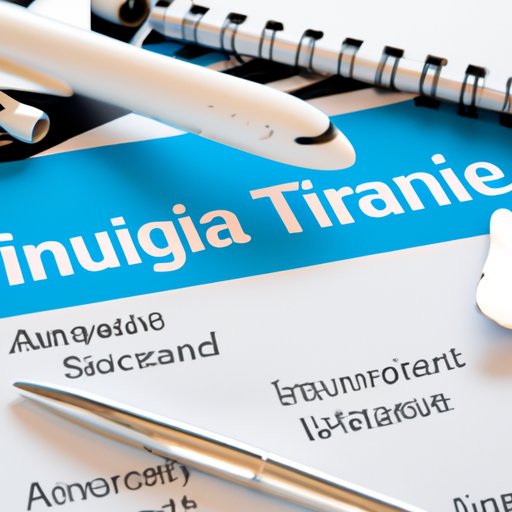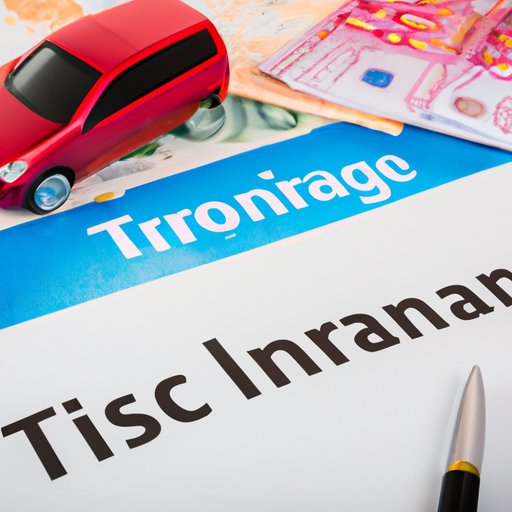Introduction
Trip insurance is an extra layer of protection that travelers can purchase to cover unexpected events when they are on their trip. These events can include cancellations, delays, lost or damaged baggage, and more. Purchasing trip insurance can help to alleviate some of the stress and financial burden that may come with these occurrences. It is important to consider the various factors involved in purchasing trip insurance before making a decision.
Examining Common Situations Where Trip Insurance Could be Beneficial
When deciding whether or not to purchase trip insurance, it is important to consider the potential scenarios that could occur on your flight. Here are some of the most common situations where trip insurance could be beneficial:
Cancellations
If your flight is unexpectedly cancelled due to weather, mechanical issues, or any other reason, you may be able to receive reimbursement from your trip insurance provider if you have purchased coverage. Without trip insurance, you may be responsible for any additional costs incurred as a result of the cancellation.
Delays
Flight delays can be inconvenient and costly. If your flight is delayed, trip insurance can provide compensation for meals, accommodations, and other expenses that may be necessary while you wait. Additionally, trip insurance can cover the cost of alternate transportation if the delay causes you to miss your connecting flight.
Lost or Damaged Baggage
Trip insurance can also cover the cost of lost or damaged baggage. This can be especially helpful if you are traveling with expensive items such as cameras, laptops, or jewelry. Without trip insurance, you may be responsible for replacing any lost or damaged items at your own expense.

Exploring Different Types of Trip Insurance Available for Flights
When purchasing trip insurance for flights, there are two main types of coverage available: basic and comprehensive. Here is an overview of each type:
Basic Coverage
Basic coverage typically includes protection against cancellations, delays, and lost or damaged baggage. It may also provide medical coverage and emergency assistance in case of illness or injury during your trip. This type of coverage is usually the least expensive option.
Comprehensive Coverage
Comprehensive coverage provides all of the benefits of basic coverage plus additional benefits such as trip interruption coverage, emergency evacuation coverage, and more. This type of coverage is usually more expensive than basic coverage but offers the most complete protection.

Investigating Costs Associated with Purchasing Trip Insurance
When purchasing trip insurance, it is important to consider the costs associated with it. The cost of trip insurance varies depending on a few factors, such as the length of your trip, the destination, and the type of coverage purchased. It is important to compare prices from different providers to ensure that you are getting the best deal.
Factors That Affect Cost
The cost of trip insurance can vary depending on the length of your trip, the destination, and the type of coverage purchased. Longer trips and trips to higher-risk destinations tend to be more expensive to insure. Additionally, comprehensive coverage is usually more expensive than basic coverage.
Comparing Prices from Different Providers
It is important to compare prices from different providers to ensure that you are getting the best deal. Compare the coverage offered by each provider and make sure to read the fine print to understand what is covered and what is not. Additionally, it is important to check for any discounts or promotional offers that may be available.

Researching Regulations Surrounding Trip Insurance for Flights
When purchasing trip insurance for flights, it is important to research the regulations surrounding it. There may be certain rules governing trip insurance policies, as well as restrictions on when and how refunds can be issued. It is important to familiarize yourself with these regulations before purchasing a policy.
Rules Governing Trip Insurance
Each trip insurance provider has its own set of rules governing its policies. It is important to read through these rules carefully to understand what is covered and what is not. Additionally, some policies may have restrictions on when and how refunds can be issued.
Understanding Refund Policies
It is also important to understand the refund policies of each provider. Some policies may allow for partial refunds if you cancel your trip before the departure date, while others may only offer full refunds. Additionally, some policies may have time limits for filing a claim or requesting a refund.
Conclusion
Purchasing trip insurance for flights can provide peace of mind and financial protection in the event of unexpected events. There are different types of coverage available, including basic and comprehensive, and the cost of trip insurance can vary depending on the length of your trip, the destination, and the type of coverage purchased. Additionally, it is important to familiarize yourself with the regulations surrounding trip insurance before purchasing a policy. Ultimately, the decision to purchase trip insurance should be based on your individual needs and preferences.
Summary of Pros and Cons
Pros: Provides financial protection in the event of unexpected events; covers cancellations, delays, lost or damaged baggage; different types of coverage available; cost can vary depending on length of trip, destination, and type of coverage.
Cons: Can be costly; regulations surrounding trip insurance can be confusing; refunds may be limited or restricted.
Final Recommendation
Ultimately, the decision to purchase trip insurance should be based on your individual needs and preferences. Consider the potential scenarios that could occur on your flight and weigh the pros and cons of purchasing trip insurance. Doing your research and comparing prices from different providers can help you find the best deal for your situation.
(Note: Is this article not meeting your expectations? Do you have knowledge or insights to share? Unlock new opportunities and expand your reach by joining our authors team. Click Registration to join us and share your expertise with our readers.)
